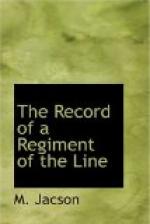There was a good deal of musketry fire whilst the scouts were out, and it was supposed that shots were being exchanged with the Boer snipers; but when the marksmen, who were posted on the hills near the Orange Free State Junction Station and just above the abandoned piggery, came back with portions of the carcasses of pigs, it was evident that all the firing had not been at Transvaal Boers.
Lieutenant Price-Dent died at 6 a.m. on the 31st December in the Intombi Hospital. It was found that a piece of shell had penetrated his brain and lodged there. He was buried in the Intombi cemetery.
Up to the end of December things had been going fairly well with the besieged. The Regiment had had plenty of hard work to keep them fit, although they had been exposed to the elements and had had to rough it considerably. But nothing in the way of disease had troubled them. With the advent of January, however, whether it was from want of exercise or from the surroundings of their new camp, disease in the form of fever and dysentery became rife. They had been situated formerly for the most part on a well-drained kopje, whereas now they were down on the flat, and in a position that was not altogether healthy. There were no longer any comforts in the shape of tobacco, etc., and the news given to them from the outside world in the place of food was of so poor a quality that the men’s minds as well as their bodies were becoming affected.
The Regiment kept heart under the depressing circumstances in a wonderful manner, and when Sir Redvers Buller kept putting off his arrival from day to day and week to week, the news that he was coming at last was generally received with a smile as if it was rather a joke.
The Boers were very busy on New Year’s Day, 1900. It was supposed that a number of excursion trains filled with the youth and beauty of the Transvaal had arrived, and consequently the young Boer blood was all for showing off. The big gun on Bulwana threw in the aggregate during the day 1-1/2 tons of iron into the town, with the result that two men were killed. There was likewise a good deal of sniping, chiefly at the Indian “grass cuts.”
One shell thrown into Ladysmith on New Year’s Day had engraved on it “Compliments of the season,” and contained a bursting charge of liquorice in the place of melinite, and a paper on which was written:—




